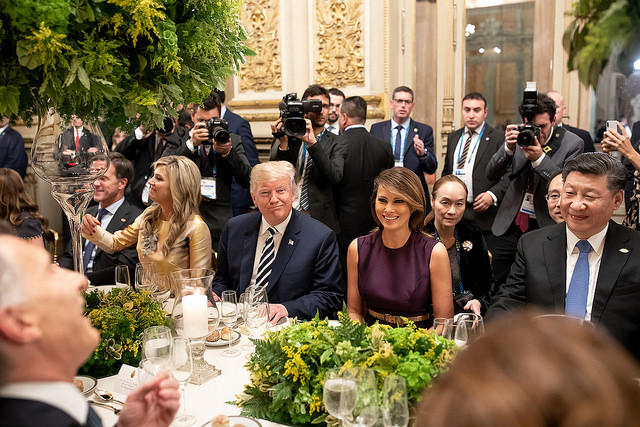
Too much expectation is being loaded on the prospect that one dinner in Buenos Aires between US President Donald Trump and China’s President Xi Jinping will solve the many differences in trade and global outlook between the two nations.
There is at least the promise of good progress, which is the most sober way to interpret Trump’s hyperbolic statement that the dinner ‘was an amazing and productive meeting with unlimited possibilities for both the United States and China’.
The leaders agreed there would be a temporary halt in plans to increase tariffs on Chinese exports to the US on 1 January. That is significant—the prospect was for a further US$250 billion worth of tariffs placed on Chinese exports.
But the halt of tariff increases depends on further talks and will surely require real progress to reduce China’s massive trade imbalance with the US, stop forced technology transfers and end Beijing’s cyber-enabled theft of US intellectual property. These are much harder tests to satisfy.
The onus will be on China to demonstrate that it’s willing, for example, to cease its industrial-scale cyber hacking of US businesses, universities and government systems. And it will need to put flesh on the bones of promises to buy a ‘very substantial … amount of agricultural, energy, industrial, and other product from the United States’.
In September 2015, then president Barack Obama extracted from Xi a commitment that China would not ‘conduct or knowingly support cyber-enabled theft of intellectual property’ and a promise that ‘China does not intend to pursue militarisation’ of the South China Sea. Of course, neither undertaking lasted.
Obama’s China policy failed because the US never applied believable red lines to stop Beijing’s bad behaviour or apply costs to punish cyber spying and illegal island building.
By contrast, Trump’s China policy has been more successful. Even before Trump was sworn in, he was rattling Beijing by musing about US support for the ‘one-China policy’ and taking an unprecedented phone call from Taiwan’s President Tsai Ing-wen.
Trump’s imposition of tariffs on Chinese exports offends trade purists, but the fact is the US economy is in a stronger position to withstand a trade war with China. The risks for Beijing are greater: China’s economy is more vulnerable, and that plays on the deep-seated fears of the Communist Party that its iron control over its people will be challenged if it can’t meet expectations for growth and relative prosperity.
Broader than trade, a bipartisan US consensus has emerged that China is now its biggest strategic competitor and that Beijing’s challenges to the international rules-based order in the South China Sea, and in the Pacific and globally via the Belt and Road strategy, need to be resisted.
For once, Trump’s gut instincts are helping. He holds out to Xi the possibility of better relations—‘We’re going to end up doing something which is great for China and great for the United States’—at the same time as the US makes clear it is unafraid of open competition with China on the economic, strategic, military and cyber fronts.
Trump at best is an awkward champion of the rules-based order. But the most striking feature of the G20 summit is just how broad the challenge is to the stability of the international system that the US, Australia and Europe all promote. Look at the roll call of G20 leaders: Vladimir Putin attends at the same time as Russia fires on and illegally holds Ukrainian sailors and ships; Saudi Arabia’s Crown Prince Mohammed bin Salman rubs shoulders with global leaders, just weeks after Riyadh’s flagrant assassination in Turkey of regime critic Jamal Khashoggi; Xi signs the G20 declaration supporting ‘the free flow of information, ideas and knowledge, while respecting … intellectual property rights protection’ at the same time as China controls all information domestically and is the biggest international cyber spy.
The delivery of a G20 communiqué where leaders could find common ground in the face of such basic differences on the international rules of the road is a minor miracle. Trump should take some credit for putting more pressure on the bad behaviour of Russia and China.
The best outcome from the dinner was Xi’s promise to place harsher legal penalties on Chinese illegal shipments of the opioid fentanyl to the US. The test will be if Xi’s commitment is any more believable than the broken undertakings he gave Obama in 2015 on cyber spying and militarising the South China Sea.

